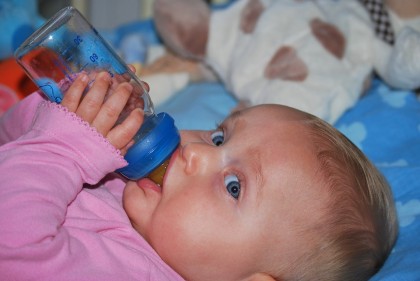“Stop calling breastfeeding ‘natural”?
Devra Torres | Mar 9, 2016
From the Not Making This Up Department comes an article by one Elissa Strauss. It's in Slate, and it's called "We Need to Stop Calling Breast-feeding Natural."

I make no brief--none at all--for assessing any mother's worth by whether, or how often, or how long she nurses her babies. As one of the lucky ones whose health and circumstances allowed me to nurse all of mine without incident, I used to thoughtlessly (though silently) judge those who didn't or couldn't or wouldn't. I didn't know any of the variables in their lives, but I didn't let that stop me.
I was eventually cured by actually talking to mothers who bottle-fed and listening to their stories.
That said, what bothers Strauss is not self-righteous "bottle shaming." Nor, I think, is she truly worried that if we keep calling breastfeeding natural, next thing you know we'll be encouraging the extremism that rejects all the vaccines, all the time, since they're "unnatural," too. But trashing the whole idea that natural means anything at all, with the excuse that some are suspicious of vaccines, is like using a cannonball to swat a fly. Maybe it seems like a stretch to Strauss, too: even she admits that
[t]here are currently no studies demonstrating a direct link between the promotion of breast-feeding as natural and the rise of parents who don’t vaccinate their children.
In fact, she's not so much objecting to making bottle-feeding mothers feel bad, and I doubt she really thinks women incapable of distinguishing between beneficial and harmful interference with nature. So what's her real beef?

She comes closer to articulating her problem (and that of the researchers she cites) here:
In a new paper recently published in Pediatrics, bioethicists Jessica Martucci and Anne Barnhill argue that the emphasis on the “natural” aspects of breast-feeding can easily backfire. By endorsing breast-feeding as natural, they say, breast-feeding advocates are reinforcing the idea that natural is A) something that actually exists and B) healthier.
Something that actually exists. Nature's not just easily misunderstood, leading to a misguided rejection of genuine progress; it's a fiction. It doesn't "actually exist."
In the old days (say, five years ago), people would argue that all kinds of things we thought were natural are actually socially constructed. And there was something to that. People chafed at the idea that, say, it was "natural" for Thanksgiving dinner to be followed by women washing dishes and men watching football. In Saudi Arabia, it's not considered "natural" for women to drive a car.
But we used to draw the line at biology. When we objected to biology being destiny, we didn't argue that "nature" in the biological sense didn't exist; but that we ought to structure society so as to circumvent some biological limitations.
People can argue about whether this was a step in the right direction.. But it was different from what's happening now. We used to argue that certain social consequences need not follow from the undeniable biological differences between man and women. Now we're arguing--what? That those differences don't exist? That biology doesn't exist? Whether it's the ad-absurdum conclusion of the same continuum or whether it's a wrong turn off a reasonable path, it's a novelty.
And it reveals what its proponents are really after.
Martucci and Barnhill also point out that to describe breast-feeding as natural is to make a number of assumptions about gender roles and family life. Are two gay dads raising their child unnaturally if they formula-feed? What about a family who adopts? Or a mom who can’t or doesn’t want to breast-feed? Surely, these are all environments in which a baby could thrive.
So that's what they're really after? Gender ideology? Not really: that, too, is just a step on the way to the real aim: rejecting reality as given. "Nature"--even in a purely secular, Darwinian sense--is something that just is the way it is. Men are not women. Mothers are not fathers. They're just not. It's just scientific reality.

And that's what's unacceptable.
